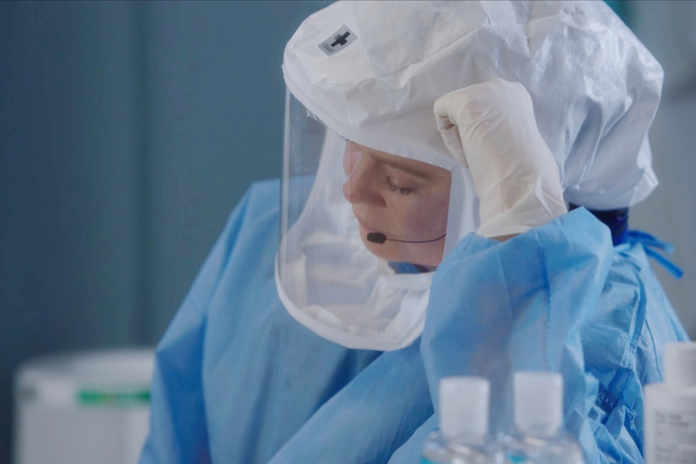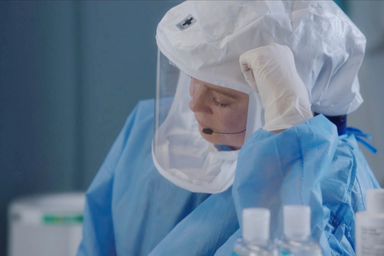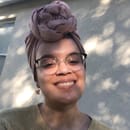Writing this article at the end of February, I find myself reflecting on almost one year of living through a pandemic. This period of my life has been punctuated by the longest period of personal isolation I’ve ever experienced. I spent six months in my house, only leaving to make trips to the grocery store, to attend doctors’ appointments where telehealth was not an option, or to have my medication administered at the hospital.
For the last six months, it has been more of the same, except I have taken on the added risk of returning to work. I feel blessed that, unlike millions of unemployed or discouraged workers, I was able to go back to work after being furloughed in April. But each trip to work is punctuated by anxiety. Each shift is spent glancing over my shoulder at a danger that I can’t see, but that I know is lurking right around the corner—or in the mouths of the customer in front of me. As I scan sweatshirts and listen to customers talk about what they’ve been up to recently, and when I log onto Instagram after clocking out, I am struck by my own resentment.
I am not typically a jealous person. But listening to people talk about their cross-country travels to visit colleges, seeing friends post pictures from amusement parks, watching IG Stories of people going out to restaurants brings about only feelings of irritation and jealousy.
Because that cannot be me. I have an autoimmune disease, I take immunosuppressive medications to manage it. I do not have the luxury of living life like it has not been profoundly altered.
Here in the United States, officials consistently fumbled the pandemic response early on, and we are still feeling the consequences of this today. While other countries curbed the spread even after multiple surges and reaffirmed vigorous containment measures after the virus or its variants reared their heads, the U.S. has been slow to act, both proactively and reactively. The inadequate response led to uncontrolled spread in the majority of the country that, despite downward trends, has continued.
As an immunocompromised person with other highly vulnerable family members, my life has been upended by the pandemic. Minimizing risk is the top priority, which means leaving the house only when necessary and double-masking when I do leave. So while my family makes anxiety-ridden trips to work and school, we incredulously watch everyone else go to clubs, Sunday brunch, and Super Bowl celebrations.
And sometimes I feel guilty for being angry. That everyone feels just as trapped as I do, that everyone is as tired of this as I am, and that’s why they’re acting as if everything is business as usual. But my reality is different from theirs. I can’t get sick of pandemic life and try to revert to normalcy, because that is a surefire way for me to actually get sick and put the lives of myself and my family in danger.
Perhaps hope is on the horizon with COVID-19 vaccines beginning to be distributed. But supplies are limited and distribution has been slow. Here in Florida, vaccine distribution has favored wealthier, whiter zip codes, with one wealthy community in Manatee County receiving thousands of doses after Governor Ron DeSantis personally reached out to the developer to set up an exclusive distribution site. The distribution plan has also only included healthcare workers and seniors on priority lists. When I spoke to my doctor, her most optimistic estimate of when I would be eligible for the vaccine was April. Realistically, it may be closer to the beginning of summer.
Across the country, disabled people have been deprioritized in the vaccine rollout, forcing a large and vulnerable population to continue to hunker down, protecting themselves from a threat that seems to have become negligible for the wider population and missing out on vital medical treatments, career opportunities, and relief from the stress and grief of our current reality.
The pandemic has not ended. It is not over for me, and it is not over for you, no matter how often you wear your mask or wash your hands or go out with friends (“socially distanced, of course!”). Simply stepping outside feels like a huge risk because I never know who is being pandemic-ly responsible. I graduate next spring, but I cannot safely travel—even though study abroad is a graduation requirement for my major. My life has stagnated, any plans I had sidelined for the foreseeable future. So above any fleeting guilt I may feel when seeing others out and about like I wish to be, I will allow myself to feel envy at their ability to do so. And I will allow myself to feel bitter, because if this community took greater care of its most vulnerable, everything—from health infrastructure to the rate of infection—would have turned out differently. None of this had to be this way.



